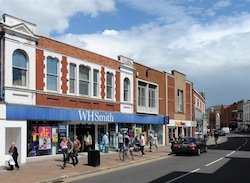 High street shops have had a tough time battling unfavourable economic conditions – 2012 was miserable for Britain’s high streets and news of insolvencies dominated the headlines.
High street shops have had a tough time battling unfavourable economic conditions – 2012 was miserable for Britain’s high streets and news of insolvencies dominated the headlines.
Insolvencies happen when a business runs out of cash. If there are no existing or new investors willing to help financially, there will be insufficient funds to pay debts. According to the Insolvency Service, insolvencies dropped significantly in 2013 – with only one in every 166 companies in England and Wales failing, in comparison to 144 in 2012.
So what has caused this sudden resilience? Are fortunes on the up for the high street?
Festive fragility
Christmas time has historically been the period when most insolvencies occur. Shoppers rush to buy the all-important Christmas presents and then during the sale periods straight after the holiday, when the chances of bagging a bargain are at their highest, there is increased footfall down the high streets and higher demand. This means that stock is converted into cash and there is a corresponding reduction of debt as sales peak. But that is followed by an immediate need for working capital for the new season.
It’s at this point when banks will reconsider their positions. If they continue to support, their exposures will increase. The historic “spike” in Christmas retail insolvencies has been at least partly a function of the banks deciding to withdraw.
However, Christmas 2013 saw far less insolvencies than 2012. So, have banks changed their attitudes to risk?
It’s widely acknowledged that the days when financial lenders would readily allow their customers large amounts of credit are long gone. Banks must be more cautious in times where they themselves are under pressure to perform. This practice hasn’t significantly changed in the past year, so it can’t explain the apparent recent improvement in retailers’ fortunes.
The landlord’s position
Could it be that landlords are making life easier for tenants - by agreeing to rent reductions or holidays, for example – and that this is the key to why Britain’s high streets are showing signs of revival?
There is little sign of that. In fact, it’s more probable that their positions have become less helpful than they have been in the past, as they are looking for a return themselves. They have their own banks and shareholders to look after, and are wary of jeopardising their financial health to support a struggling tenant, putting the pressure back on the tenant’s investors to find a solution.
Smarter retail
The most likely explanation is a shift in consumer confidence, coupled with smarter business management. Positive economic data has been consistently released week on week, and the recently-announced freeze on interest rates was no doubt designed specifically to enhance the perceptions of shoppers that its “safe” to spend. As unemployment falls, more people have greater access to a disposable income. This may, however, be offset by rising property prices, which knocks on into increases in domestic rents.
The upturn for retailers though may also be attributed to them being better at what they do than they were in 2012. High street chains and independent shops have evolved during the tough conditions of the recession and have learnt how to bolster sales using their existing resources. By developing internet channels and focussing on in-store advice and service, they have more powerful brands than pure e-tailers and whether a sale is made in-store or on-line, they have been able to fend off the competition and survive.
So much so that although we have seen a few operational restructurings involving store closures, cutting down of workforces and re-evaluation of supply chains, these have not been as widespread as in earlier years.
A formula for success?
As long as businesses are able to manage their cash flows effectively, they will survive. High streets that attract people - who will always want to be entertained, fed and watered - and which provide ample and cheap car-parking will remain premium retail environments. Those inhabiting the space and using it wisely will continue to see sales increase, albeit the point of sale may not often be in-store. Retailers have found cash flow problems slowly fading as they receive a boost from their most importance source – consumers.
About the author
 Jeremy Goldring is a partner at international law firm King & Wood Mallesons SJ Berwin
Jeremy Goldring is a partner at international law firm King & Wood Mallesons SJ Berwin
Have you any commercial property events you'd like to tell us about? It could be networking, exhibitions, seminars, industry lunches or sporting fixtures. We will list them for free. Just email newsdesk@propnews.co.uk with the following details: Event name, date, time, venue, cost, booking info and a brief description of the event.
To list your property job vacancies on Property News. Email: richenda@propnews.co.uk.